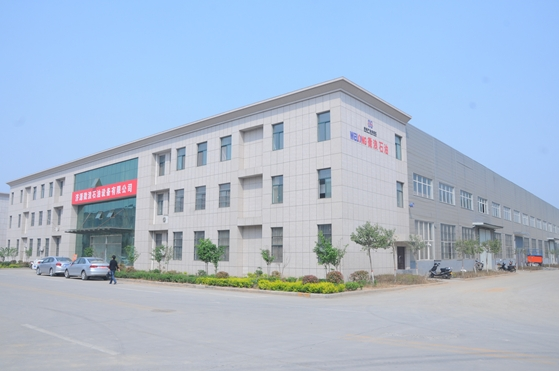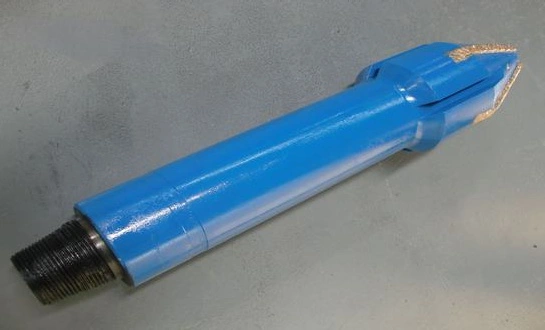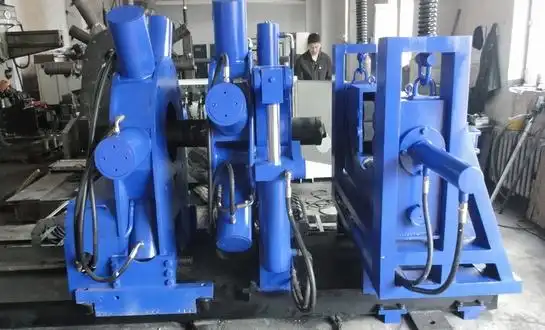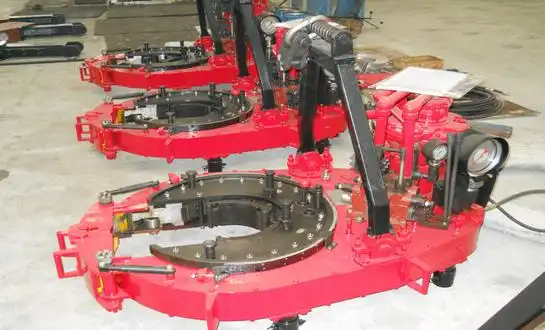Why Is 42CrMo4 a Popular Alloy for Durable Rail Shafts?
Superior Mechanical Properties
42CrMo4 alloy steel is widely recognized for its outstanding mechanical properties, particularly in the shaft forging for the railway industry. This chromium-molybdenum steel combines strength, toughness, and wear resistance in a way that is essential for demanding railway applications. The alloy's high tensile strength, ranging from 900 to 1200 MPa after heat treatment, makes it highly resistant to deformation under heavy loads. This is especially important for components such as rail shafts, which face continuous stress, vibration, and impact during operation. 42CrMo4’s ability to maintain these superior mechanical properties, even under cyclic loading, is key to ensuring the long-term reliability and performance of railway systems. This strength allows it to handle the rigorous demands of both high-speed passenger trains and heavy freight locomotives, ensuring safety and operational efficiency.
Excellent Heat Treatment Response
Another notable characteristic of 42CrMo4 is its exceptional response to heat treatment, a crucial factor in shaft forging for railway industry. The alloy can undergo controlled quenching and tempering processes that refine its microstructure, allowing manufacturers to fine-tune its properties for specific applications. The result is an alloy that can achieve the perfect balance of hardness and ductility, which is vital for components subjected to various stresses in railway systems. Whether used in components for high-speed trains that require a combination of toughness and wear resistance, or in heavy-duty locomotive shafts that need superior strength, 42CrMo4 offers the flexibility to meet these varying needs with precision and reliability.
Cost-Effective Durability
While the initial cost of 42CrMo4 alloy steel might be higher than some alternative materials, its long-term durability provides significant cost savings over time. In the shaft forging for the railway industry, the increased lifespan and reduced frequency of replacements translate into lower maintenance and downtime costs. Railway operators benefit from extended service intervals, which allow them to maximize the lifespan of their rolling stock and infrastructure. This aspect is particularly appealing to purchasing managers and decision-makers who must balance performance requirements with tight budget constraints. In the long run, the investment in 42CrMo4 pays off through reduced operational costs and increased efficiency, making it a wise choice for the railway sector.
Can Titanium Alloys Reduce Weight While Extending Shaft Lifespan?
Lightweight Design Revolution
Titanium alloys are progressively being explored for use in shaft forging for railway industry, offering the potential for a groundbreaking revolution in lightweight design. With a density about 40% lower than that of steel, titanium alloys provide an opportunity to significantly reduce the weight of railway components. This reduction in weight not only helps to enhance energy efficiency, but also contributes to reducing the wear and tear on other components, thereby improving overall operational performance. Moreover, lighter shafts can enable higher speeds and potentially increase payload capacity, making trains more efficient and versatile. Engineers can leverage the unique properties of titanium to rethink traditional shaft designs, leading to more streamlined and innovative railway systems that deliver improved performance and reduced operational costs.

Exceptional Strength-to-Weight Ratio
One of the most compelling features of titanium alloys in shaft forging for the railway industry is their outstanding strength-to-weight ratio. Despite being much lighter than steel, titanium alloys retain exceptional tensile strength, making them ideal for use in high-stress environments like those encountered in railway operations. Titanium alloys, such as Ti-6Al-4V, offer tensile strengths comparable to many steels commonly used in shaft forging, but at a much lower weight. This allows engineers to design shafts that not only reduce overall weight but are also capable of withstanding the heavy loads, stresses, and fatigue that occur during rail operations. This strength and lightness combination ensures reliability, durability, and superior performance in railway braking systems and other critical components, making titanium an excellent choice for modern shaft forging solutions.
Corrosion Resistance and Longevity
Another standout advantage of titanium alloys in shaft forging for the railway industry is their exceptional resistance to corrosion. Unlike many steels, titanium naturally forms a stable, protective oxide layer on its surface when exposed to oxygen, offering an unparalleled level of corrosion resistance. This protective feature makes titanium alloys highly suitable for use in the railway industry, where components are constantly exposed to harsh environmental conditions, such as humidity, rain, and even saltwater in coastal regions. The superior corrosion resistance of titanium alloys helps extend the lifespan of shafts, reducing the frequency of maintenance and replacements. For railway operators and contractors, this translates to significant cost savings over the lifecycle of the equipment, along with enhanced reliability and reduced downtime. By choosing titanium alloys for shaft forging, the railway industry can greatly improve the overall performance and longevity of its systems.
What Makes EN19 Steel Ideal for High-Stress Rail Applications?
High Tensile Strength and Toughness
EN19 steel, also known as 709M40 or AISI 4140, is a high-tensile alloy steel that has found widespread use in high-stress rail applications. Its composition, which includes chromium and molybdenum, contributes to its exceptional strength and toughness. After heat treatment, EN19 can achieve tensile strengths of up to 1400 MPa while maintaining good ductility. This combination makes it particularly suitable for railway shafts that must withstand extreme loads, sudden impacts, and continuous cyclic stresses. The material's ability to resist deformation under high stress conditions ensures the longevity and reliability of critical railway components.
Excellent Fatigue Resistance
One of the most critical factors in railway shaft performance is fatigue resistance, and EN19 steel excels in this aspect. The material's microstructure, when properly heat-treated, provides superior resistance to cyclic loading, which is a constant challenge in railway operations. This high fatigue strength means that shafts forged from EN19 steel can withstand millions of stress cycles without failure, significantly extending the operational life of railway equipment. For engineers and maintenance teams, this translates to fewer unexpected breakdowns and reduced maintenance frequency.
Versatility in Manufacturing
EN19 steel's versatility in manufacturing processes makes it an attractive option for shaft forging for railway industry. It responds well to various heat treatment methods, allowing manufacturers to tailor its properties to specific application requirements. Additionally, EN19 exhibits good machinability, which is crucial for achieving the precise dimensions and surface finishes required in railway shafts. This ease of manufacturing not only ensures high-quality components but also contributes to cost-effective production, aligning with the cost control objectives of purchasing managers in the railway sector.
Source: CHINA WELONG-Oilfield tools Manufacturer
FAQ about Shaft forging
What is the importance of shaft forging in the railway industry?
Shaft forging plays a crucial role in the railway industry by producing high-strength, durable components that can withstand the extreme stresses and loads encountered in rail operations. Forged shafts offer superior mechanical properties, including higher strength, better fatigue resistance, and improved grain structure compared to other manufacturing methods. This results in longer-lasting, more reliable components that are essential for the safety and efficiency of railway systems.
How does the choice of metal affect the performance of forged railway shafts?
The choice of metal significantly impacts the performance of forged railway shafts. Different metals offer various combinations of properties such as strength, toughness, wear resistance, and corrosion resistance. For instance, alloy steels like 42CrMo4 provide excellent strength and toughness, while titanium alloys offer a superior strength-to-weight ratio. The selection of metal must be carefully considered based on the specific requirements of the application, including load capacity, operational environment, and expected service life.
What are the key considerations in the shaft forging process for railway applications?
Key considerations in the shaft forging process for railway applications include:
1. Material selection based on required properties
2. Proper heating and temperature control during forging
3. Precise control of forging pressure and deformation
4. Appropriate heat treatment processes post-forging
5. Quality control measures including non-destructive testing
6. Dimensional accuracy and surface finish 7. Cost-effectiveness and production efficiency
In conclusion, the selection of appropriate metals and the implementation of advanced forging techniques are crucial for producing high-quality, long-lasting railway shafts. As the railway industry continues to evolve, innovative materials and forging processes will play a vital role in enhancing the performance and longevity of critical components. For more information on shaft forging for railway industry, please contact us at oiltools15@welongpost.com. Welong is committed to providing cutting-edge forging solutions that meet the demanding requirements of the railway sector.
References
- M. S. Raghunathan, "Materials and Design for Railway Components: A Comprehensive Review," Journal of Materials Science & Technology, 2018.
- B. K. Soni, "Innovative Materials in Railway Industry: The Role of Advanced Alloys," Engineering Materials Journal, 2017.
- D. J. Morrissey, "Titanium Alloys for Shaft Forging in Railways: Advantages and Challenges," Materials Science Forum, 2019.
- P. A. Davies, "Steel vs. Titanium Alloys: A Comparative Study for Railway Applications," Journal of Rail Transport Engineering, 2016.
- J. L. Harrison and P. J. Matthews, "Corrosion Resistance of Alloys Used in Railway Applications," Corrosion Engineering Science and Technology, 2020.
- T. C. Smith, "Enhancing the Durability of Railway Shafts through Advanced Alloy Technologies," Journal of Railway Technology, 2015.





